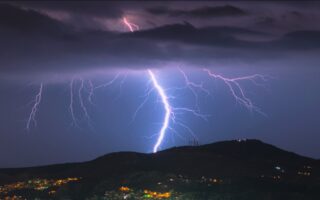The Samaria Gorge in Crete will be closed at both entrances on Sunday due to forecasted rainfall.
WEATHER
Greece is set to experience an “Indian Summer” or “Saint Demetrius’ Summer” this October, according to the director of the National Meteorological Service, Theodoros Kolydas.
A man died in Lepeno, Agrinio, in Aetolia-Acarnania, as Storm Cassandra caused extensive damage across Western Greece.
Clouds and scattered showers are expected Sunday in the Ionian, western and northern mainland, northern and eastern Aegean and Crete, with isolated storms in some areas.
A storm system named Cassandra is expected to affect western Greece on Friday, bringing clouds, rain, and isolated thunderstorms, according to a bulletin from the National Meteorological Service (EMY).
A stormy weather system dubbed Cassandra is expected to make an appearance in Greece on Friday, after hitting northern Italy and parts of the Western Balkans.
A severe weather alert has been issued for Greece, predicting strong winds, a sharp temperature drop and heavy rain in certain regions from Sunday through Monday.
After nearly a week of early summer temperatures in most parts of the country, thermometers across Greece are expected to drop back down to fall-time levels starting on Sunday afternoon and until Monday, with forecasters predicting a decrease in the daytime highs by as much as 9 degrees Celsius.
Good weather is expected to continue on Sunday, with mild temperatures and occasional local showers.
A bulldozer is a statement of determination; it is even reassuring somehow when it appears in a news story on our television screens. It is a statement that the laws of the land are being upheld, whether it is demolishing illegal constructions or removing trash and debris from our streams and culverts.
Greece “stands in solidarity with Romania, Poland, Czechia, Austria, and Moldova,” where at least 16 people have died in flooding in the past few days.
Athens Mayor Haris Doukas has urged the government to implement anti-flooding infrastructure following damage from Storm Atena.
Storm Atena caused major traffic problems on the island of Rhodes after hitting on Wednesday afternoon.
Passengers on a bus in the northern Athenian suburb of Galatsi were trapped for an extended period on Tuesday due to heavy flooding from Storm Atena.
The regional authority of Eastern Macedonia and Thrace has decided to postpone the reopening of schools due to Storm Atena, it was announced on Tuesday.
Zakynthos and Corfu recorded 70 millimeters of rain by 8.30 a.m. on Tuesday as Storm Atena makes its way across the country.













